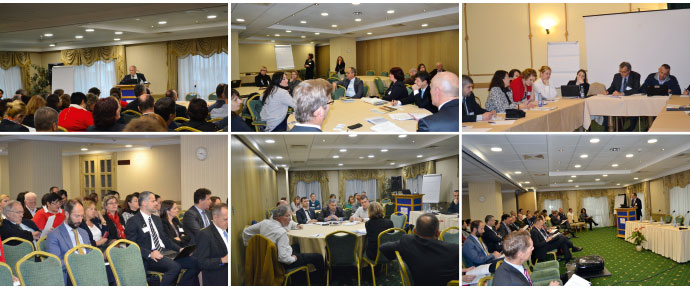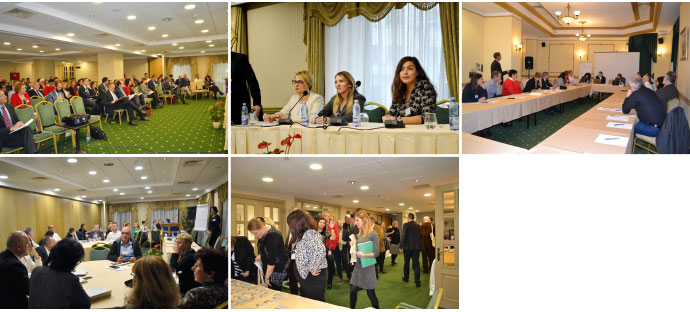Danube Watch 3/2017 - International Workshop on Wastewater Management in the Danube River Basin
International Workshop on Wastewater Management in the Danube River Basin
Bucharest played host to the first International ICPDR Workshop on Wastewater Management in the Danube River Basin on 28-29 November 2017. The workshop was co-organised by the ICPDR, the International Association of Water Supply Companies in the Danube River Catchment Area (IAWD), the World Bank, and the Joint Research Center of the European Commission. The event was hosted by the National Administration “Romanian Waters” and the Romanian Ministry of Waters and Forests.

The initiative was a response from the ICPDR to requests from the countries in the Danube River Basin, which had expressed a need to deal more specifically with the multi-dimensional problem of wastewater management under the ICPDR’s umbrella.
The countries had already identified the challenges they were facing before the workshop and outlined potential issues that needed addressing. The workshop was then organised to bring together the relevant administration (national and local authorities) and utility sectors together with all relevant stakeholders for joint discussions on the following three pillars:
- Investment & Financing
- Management & Operation
- Innovation & Technology
The objective of the workshop was to establish a clear concept of roles and responsibilities for all stakeholders involved, and to identify all necessary further steps to be taken to enhance the sustainable management of wastewater infrastructure and services. Moreover, the workshop provided the participants with a platform to identify, share and discuss best practices and cost-efficient solutions for wastewater management.
 Investment and Financing
Investment and Financing
Understanding the financial issues behind the construction, upgrading and extension of wastewater collecting systems and treatment plants is crucial for the improvement, maintenance and efficient operation of wastewater infrastructure and facilities. Funding sources, ways of adsorbing funds, investment prioritisation according to cost-efficiency and cost-benefit analysis were all critical issues discussed during plenary sessions.
Emphasis was placed on the need for tariffs that are both sufficient, appropriate and also affordable. Proper incentives and accountability measures need to be in place if newly established infrastructures are to operate in a sustainable manner, which is in compliance with wastewater collection, treatment and discharge standards.
Management & Operation
There is substantial demand – at national, regional and local levels – for qualified experts in the field of wastewater management-related project development and implementation. In order to better absorb available funds, people with appropriate organisational and strategic skills at all levels are essential. Moreover, regulation and control of implementation issues at water authority level are of the utmost importance.
Utilities often lack sufficiently trained technical experts. Well-developed training and capacity-building programmes targeting the operation and maintenance of wastewater infrastructure are therefore necessary to ensure not only a qualified workforce, but also efficient and sustainable wastewater treatment.
Innovation & Technology
Technological progress coupled with a growth in environmental awareness in dealing with water resources has led to a number of technological breakthroughs. Options are constantly expanding, ranging from sludge and wastewater reuse, biogas utilisation, energy optimisation to treatment of organic micro-pollutants, all of which allow for the utilisation of resources by adopting a technology-driven and environmentally aware approach.
The establishment of individual or small-scale, decentralised treatment systems is recommended in small agglomerations with a population equivalent of below 2,000, and in areas where construction of sewer systems is not feasible. Wastewater management can be sensibly managed by means of decentralised treatment facilities to ensure technically and economically viable infrastructure.
Take-home messages
The workshop was successful in raising awareness with regard to a number of issues, the most important being:
- 18% of people in the Danube region do not have access to sanitation due to issues of underdeveloped/missing infrastructure or affordability. UWWTD guidelines dictate that investments should be made to establish proper wastewater infrastructure and the costs should be recoverable. However, countries should have the opportunity to deviate from this principle if it is deemed necessary, thereby making tailor-made solutions for individual Wastewater Treatment Plants (WWTPs) possible.
- The Danube region is changing rapidly, technology is constantly evolving and the trend is moving towards innovation. The question is what type of innovative wastewater technology should be adopted and developed to make wastewater viable as a resource.
- Sustainability is key in terms of wastewater management and a clear strategy is needed, along with a regional approach. There is an urgent need to develop capacities and speed up the process of joining the EU in the non-EU Member States.
- Construction of WWTPs needs better preparation in terms of data collection, and a sound basis for decision-making during the planning phases. A regional approach is also needed in terms of establishing enabling proper regulatory frameworks, public participation (tariffs, consumer awareness), etc.
- With the right incentives, proper capacities at a local level and more autonomy for utilities to make their own decisions, progress can be made and a smarter approach towards wastewater management achieved.







